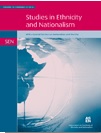DEADLINE: NOVEMBER 20, 2019
In recent years, the world has witnessed a significant increase in incidents of violence, which have been largely contributed to the rise of nationalism. Polarisation of public sentiments and seismic shifts in the confidence of the public in governance structures in the Western world have contributed to the rise of far-right sentiments and support. This was demonstrated in the 2016 Brexit referendum in the UK, as well as during the rise of anti-immigration sentiments in Europe and the US post-2011 amid one of the worst humanitarian crises in the Middle East.
Conceptually, “violence” remains to be one of the most elusive and most difficult concepts to define and measure in the social sciences (Imbusch, 2003). An extremely complex phenomenon that invites a breadth of interdisciplinary research, the Studies in Ethnicity and Nationalism (SEN) is launching this call for papers for a special issue on Violence and Nationalism. Though the interplay between both concepts has become the subject of much consideration both in the media and academia in recent years, our interest extends beyond recent events. We particularly welcome interdisciplinary research approaches.
The following is a non-exhaustive list of research areas and topics we would be interested in for this special issue:
- Theoretical analysis of the concept of violence in relation to nationalism
- Migration, violence and nationalism
- Radicalisation, religion and nationalism
- CVE/PVE and nationalism
- Comparative nationalism and violence in small states
- Technology and violence
- Populism, activism and nationalism
- Proto-insurgencies
- Poverty, nationalism and violence
- Identity politics, citizenship and violence
- Minority rights and violence
- Everyday violence and its narratives
- Regional perspectives on nationalism and violence
- Brexit referendum and its aftermath
- Post-9/11 US politics and violence
* Imbusch, Peter (2003). “The Concept of Violence”: 13-39 in Heitmeyer, Wilhelm, and Hagan, John. International Handbook of Violence Research. Dordrecht: Kluwer Academic Publishers.
Process and Deadlines:
With this call we aim to cast our net wide and to attract scholars working on violence, which is a theme of particular interest to the editors of SEN beyond this call. For this special issue, we welcome both individual and group proposals for consideration for publication. Individual paper proposals will be evaluated in their own merit even if submitted as part of a group submission. Papers of significant contribution and quality that are not selected for this special issue (due to considerations of relevance or “fit” with the rest of the papers in the issue) will be considered for publication separately in our regular issues.
Important deadlines:
October 16: Call for Papers launch
November 20: submission of paper proposals and expression of interest:
- Individual scholars interested in submitting an individual paper proposal are invited to submit: (1) a proposed title; (2) 500 words proposal/abstract; and (3) a biography of author(s).
- Scholars interested to submit as a group (of 5-6 individual papers) are invited to submit: (1) a biography of the proposed guest editor and authors; (2) proposed titles and 500 words proposal/abstract for each individual paper; (3) 200 words on the importance of the theme of the group submission.
- Scholars interested in submitting short feature articles on the topic are also welcome to express interest separately to the editors by submitting: (1) a proposed title; (2) a short 250 word abstract; and (3) a biography of the author.
If authors already have a paper ready for submission, they are welcome to submit it already at this stage, which will facilitate and accelerate the peer-review and publication process.
December 1: Editors will inform authors whose paper proposals have been accepted for consideration for publication in the special issue on violence and nationalism. All submitted papers will go through a double-blind peer-review process once finalised and submitted.
The editors will approach all other authors to discuss possible avenues of collaboration. SEN is considering setting up a research network on the topic in the future.
January 20: submission of final papers for peer-review. The papers will go through an accelerated double-blind peer-review process.
We expect the papers to be published in SEN’s October 2020 issue. Accepted authors and interested scholars in the topic, who express interest as part of this call, will be invited to attend SEN’s 20th Anniversary Event in London in November/December 2020 (university venue is yet to be decided), which will focus on violence and nationalism.
Please send all submissions to SEN’s Editors (Dr Dina Mansour-Ille: dmansourille@sienjournal.com and Dr Anastasia Voronkova: a.voronkovadr@gmail.com) clearly stating “Violence and Nationalism Special Issue” in the subject line.
About Studies in Ethnicity and Nationalism:
Studies in Ethnicity and Nationalism (SEN) is a fully-refereed journal on ethnicity, identity and nationalism, published by Wiley-Blackwell on behalf of the Association of the Studies in Ethnicity and Nationalism (ASEN). The sources and nature of ethnic identity, minority rights, migration and identity politics remain central and recurring themes of the modern world. The journal approaches the complexity of these questions from a contemporary perspective and, based on the latest scholarship, draws on a range of disciplines including political science, sociology, anthropology, economics, international relations, history and cultural studies.
SEN publishes three issues per volume, including regular special issues on themes of contemporary relevance. The journal aims to showcase exceptional articles from up-and-coming scholars across the world, as well as concerned professionals and practitioners in government, law, NGOs and the media, making it one of the first journals to provide an interdisciplinary forum for established and younger scholars alike. The journal is strictly non-partisan and does not subscribe to any particular viewpoints or perspective. All submitted articles to SEN go through a double-blind peer-reviewed process by scholars specialists in their respective fields.



![Israel-Palestine: Is it even relevant anymore? Pro-Palestine demonstrators wearing Netanyahu masks protest in front of the Washington Convention Center [AP]](http://www.aljazeera.com/mritems/imagecache/mbdxxlarge/mritems/Images/2015/3/2/e44473554507412789a79222fd2e8de8_18.jpg)